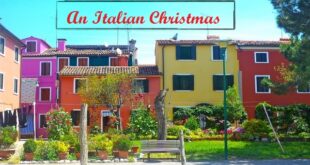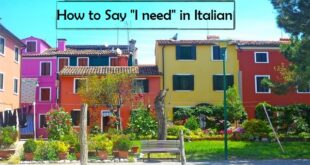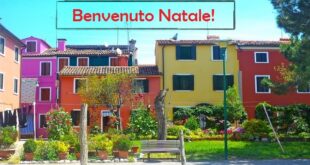Christmas in Italy There are several important holidays that Italians celebrate during the Christmas season (periodo di Natale), which begins on December 8th with L’Immacolata and ends on January 6th with L’Epifania. The feast of Santa Lucia on December 13th is also an important holiday in northern Italy. This saint day is celebrated with candles, special pastries and presents for children who have been good during the year. See the table below for a list of the important celebrations that take place in Italy during the Christmas season and some common phrases that Italians use to wish each other “happy …
Read More »Search Results for: piacere
“Missing you” with mancare
The verb mancare has many meanings: to miss/to lose/to lack/to be lacking/to omit/to fail. Perhaps the most common way to use mancare is to convey the idea of missing someone, so it is important to learn the conjugation and sentence structure for this verb for everyday speech. To start off, you should know that the sentence structure used for mancare is the same as for the verb piacere, the prototype for Italian verbs that only take an indirect object pronoun. You should also realize that this group of Italian verbs works differently from its English counterparts. Therefore, the English translation will not match the Italian …
Read More »TV and movies in Italian
How do I say, “TV show” and “movies” in Italian? The programs we watch on a television set (il televisore) or on a screen (lo schermo) are referred to most commonly in both English and Italian as “TV.” The pronunciation, of course, is different in each language. In Italian, the abbreviation “TV” is pronounced as an Italian would pronounce the letters “t” and “v,” which sounds like “tee-vooh.” Notice from the table below that there is an Italian word for TV programs in general (la televisione), and therefore the Italian abbreviation TV is feminine as well, and takes the feminine …
Read More »What I need
Ho bisogno di… When we express our needs, we are also communicating our feelings, and the ability to do this in different ways makes our language skills much more rich. In Italian, there are several verb phrases that can be chosen if one want to express a need: “ho bisogno di,” “mi serve,” and “averne voglia.” Many times, these three verb phrases are interchangeable, but there are subtle differences that determine the choice one makes to use each one. The very popular phrase, “ho bisogno di…” means, “I need…” The verb ho is, of course the first person conjugation of …
Read More »Italian Past: Avere or Essere?
Every Italian student starts by speaking only in the present tense — that is, about what is happening in the “here and now.” But what if we want to refer back to an event that has happened in the recent past, such as this morning, yesterday, or last year? Well, then, will have to learn how to form the passato prossimo past tense! The passato prossimo translates into English as the present perfect tense and the simple past tense; in effect, when we learn this one type of past tense in Italian, we can substitute it for two types of …
Read More »Rolling Meadows High School
Come senior d’italiano AP, ci fa piacere essere studenti di un programma giovanile pieno di energia, rispetto, e passione. L’anno scorso abbiamo scritto che il nostro Prof. ci prepara il caffè e chiacchiere una volta al mese. Quest’anno siccome la classe è nel pomeriggio, non ha senso preparare del caffè prima di pranzo. Noi adoriamo come il nostro Prof. cerca sempre di darci l’opportunità di esprimerci in qualsiasi maniera. Siccome la classe è nel pomeriggio, il Prof ha deciso di continuare questa bell’attività con Focaccia e Sfincione, un tipo di pizza siciliana. L’idea è simile al caffè e chiacchiere dove …
Read More »Benvenuto Natale!
How to Use Benvenuto! and Italian Holiday Party Conversation “Benvenuto!”* and its variations (Benvenuti! Benvenuta! and Benvenute!) are frequently used Italian interjections that all mean “Welcome!” Guests (gli ospiti) to an Italian household can expect to hear these words as a warm greeting before crossing the threshold into the home (casa) of the host or hosts (la padrona di casa/il padrone di casa or gli ospiti).** Whether family, friend or acquaintance, every guest will be greeted warmly as a sign of the Italian dedication to hospitality for all. And, of course, the Italian Christmas season, which starts in early December and lasts until early January, …
Read More »Glenbard North High School
Sono cresciuta intorno a una grande famiglia d’italiani. Mia nonna è nata in Italia però lei è venuta negli Stati Uniti con mio nonno quando loro erano giovani. I miei genitori sono della stessa città e si sono conosciuti in Italia quando mia madre era in vacanza. Mio padre è nato in Italia però è venuto negli Stati Uniti con mia madre dopo che loro si sono sposati, per dare ai miei fratelli e a me una vita migliore. L’italiano è una cosa importante per me perché tutta la mia famiglia è italiana. Io devo imparare a parlare italiano davvero …
Read More »How to say, “I love you!”
To tell someone we love them in Italian, we must first learn how to use the verb amare, which means “to love.” But be careful! Because this is the Italian verb of romantic love! In fact, Italians often address their romantic love simply as “amore,” which is the noun that means “love.” Italians also address loved ones as “amore mio,” which means “my love.” Beautiful, isn’t it? The full conjugation of this important verb is given below, with the stressed syllables underlined. Amare – to love io amo I love tu ami you (familiar) love Lei/lei/lui ama you (polite) she/he loves noi amiamo we love …
Read More » Fra Noi Embrace Your Inner Italian
Fra Noi Embrace Your Inner Italian










